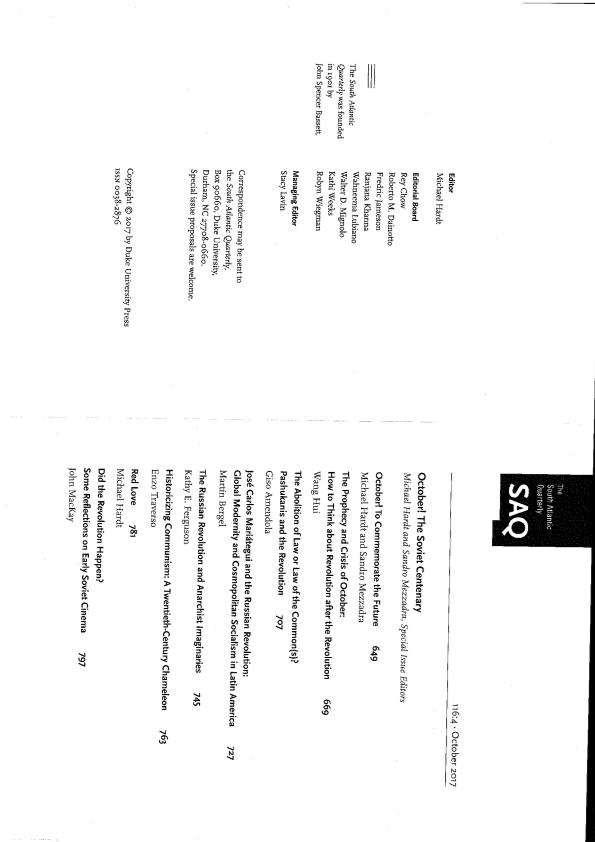Mostrar el registro sencillo del ítem
dc.contributor.author
Bergel, Martin

dc.date.available
2019-04-25T16:53:08Z
dc.date.issued
2017-10
dc.identifier.citation
Bergel, Martin; José Carlos Mariátegui and the Russian revolution: Global modernity and cosmopolitan socialism in Latin America; Duke University Press; South Atlantic Quarterly; 116; 4; 10-2017; 727-744
dc.identifier.issn
1527-8026
dc.identifier.uri
http://hdl.handle.net/11336/75030
dc.description.abstract
Este ensayo postula que la Revolución Rusa representó para Mariátegui no solamente un acontecimiento que lo impulsó a adoptar el credo socialista que lo acompañaría hasta su muerte en 1930, sino a colocar su praxis intelectual dentro de un cuadrante global. Contra las visiones que ciñen su pensamiento a una perspectiva nacional, el ensayo argumenta que la clave que ordena la trayectoria de Mariátegui está dada por un socialismo de tipo cosmopolita. Esa perspectiva, que el peruano desarrolla en su labor cotidiana en la prensa periódica, se desgrana en una serie de dimensiones de su pensamiento, tales como la preeminencia que tiene la dimensión temporal por sobre la espacial, el peso que detentan en su obra las filosofías, las literaturas y las artes contemporáneas, y el prisma asimismo mundial que se deriva de su adscripción al marxismo.
dc.description.abstract
In contrast to the hegemonic perspective that in Latin America seeks to read José Carlos Mariátegui as a quintessential figure in the fusion of Marxism and the national question, this essay approaches the Peruvian intellectual as an expression of cosmopolitan socialism. As the essay demonstrates, this cosmopolitanism was particularly motivated by the Russian Revolution, which for Mariátegui was both a key element in his adherence to Marxism and a powerful vector that led him to internationalize his interests and envisage a broad spectrum of cultural and political phenomena throughout the world. The press, the principal space in his intellectual education, together with literature, philosophy, and the arts from a variety of distant places, became the subjects of Mariátegui’s close attention as his field of vision expanded following the events of 1917 and were scrutinized as elements key to understanding the dynamics of the proletariat movement around the globe. Thus for this intellectual, who in a manner unparalleled in Latin America managed to superimpose political vanguardism and aesthetic vanguardism, socialism and cosmopolitanism were orientations that interacted and mutually reinforced each other.
dc.format
application/pdf
dc.language.iso
eng
dc.publisher
Duke University Press
dc.rights
info:eu-repo/semantics/openAccess
dc.rights.uri
https://creativecommons.org/licenses/by-nc-sa/2.5/ar/
dc.subject
Mariátegui
dc.subject
Revolución Rusa
dc.subject
Socialismo Cosmopolita
dc.subject
Intelectual Global
dc.subject.classification
Otras Sociología

dc.subject.classification
Sociología

dc.subject.classification
CIENCIAS SOCIALES

dc.subject.classification
Ciencia Política

dc.subject.classification
Ciencia Política

dc.subject.classification
CIENCIAS SOCIALES

dc.title
José Carlos Mariátegui and the Russian revolution: Global modernity and cosmopolitan socialism in Latin America
dc.type
info:eu-repo/semantics/article
dc.type
info:ar-repo/semantics/artículo
dc.type
info:eu-repo/semantics/publishedVersion
dc.date.updated
2019-04-25T14:11:57Z
dc.journal.volume
116
dc.journal.number
4
dc.journal.pagination
727-744
dc.journal.pais
Estados Unidos

dc.journal.ciudad
Durham
dc.description.fil
Fil: Bergel, Martin. Consejo Nacional de Investigaciones Científicas y Técnicas; Argentina. Universidad Nacional de Quilmes. Departamento de Ciencias Sociales. Centro de Historia Intelectual; Argentina
dc.journal.title
South Atlantic Quarterly
dc.relation.alternativeid
info:eu-repo/semantics/altIdentifier/url/https://read.dukeupress.edu/south-atlantic-quarterly/article-abstract/116/4/727/132972/Jose-Carlos-Mariategui-and-the-Russian?redirectedFrom=fulltext
dc.relation.alternativeid
info:eu-repo/semantics/altIdentifier/doi/https://doi.org/10.1215/00382876-4234972
Archivos asociados
